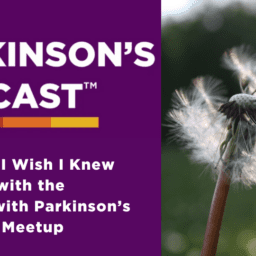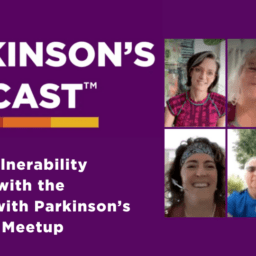Receiving a Parkinson’s diagnosis when you’re young is overwhelming enough. Being a woman with a Parkinson’s diagnosis adds an additional layer of complexities and challenges.
In this panel discussion, our YOPD Women’s Council and special guest Dr. Karen Jaffe, MD, talked about the added challenges women living with Parkinson’s face as it relates to menstruation, menopause, and hormones.
You can watch the video below.
To download the audio, click here.
You can read the transcript below. To download the transcript, click here.
Note: This is not a flawless word-for-word transcript, but it’s close.
Melani Dizon (Director of Education and Research, Davis Phinney Foundation):
So, if you like to see the transcript on your screen you can keep it as it is. If you would prefer not to see the words, you just click the little arrow, near the CC, I’m not exactly sure what you see on your screen, I think it’s a CC and then you can just click the arrow and it’ll give you an option to hide the subtitle. So, you can hide that if you don’t like to see it. I would love for you to chat us and let us know who you are and where you’re calling from, I love to know who our people are.
So, just let us know that you can hear us otherwise we get worried, oh Sydney said hi so we know somebody can hear us and see us. I think that’s it. Oh Trudy, Central PA, Oxbridge, I do not know, I’ve never heard that before.
Gaynor Edwards (YOPD Women’s Council Leader and Founder of YOPD Spotlight): It’s West London.
Melani Dizon:
Okay, cool. love it. Okay, I will pass this over to Gaynor right now, take it away.
Gaynor Edwards:
Hello, thank you for joining us, everyone.
We are delighted to have Dr. Karen, we have two Karen’s on the panel, so we are going to separate them as Dr. Karen, and I’m sorry Karen, we’re just calling you, Karen. Is that alright?
There’s so many issues all of us are very much aware from a very personal point of view about the issues that there are at a certain time of life in particular, or as you approach a certain type of life, perhaps, but just generally menopause.
Is it if you have particularly bad PMS symptoms that it gets worse when you have Parkinson’s? Do your drugs do not work or is it that the Parkinson’s becomes worse, what is it? So, this is what we’re kind of going to be discussing.
But Dr. Karen, would you like to introduce yourself on what you’re working on at the moment?
And Mel, do we do we need to go around the rest of the panel? Okay, if we start with Dr. Karen, and then we’ll do the rest of the panel as well.
Dr. Karen Jaffe, MD (Physician, Founder of In Motion and Parkinson’s Advocate):
Hi everyone, I’m here in Cleveland, Ohio, so it’s two o’clock here for me. And it’s a real pleasure for me to come and join you on this Davis Phinney Foundation on this panel.
I was diagnosed with Parkinson’s disease 14 years ago at age 47, and as a physician, practicing OBGYN at the time in Cleveland, and was really scared by that diagnosis, you know, I had no idea. You think that I would have a leg up on knowing what was going on being a physician, but I really didn’t, I didn’t know anything about Parkinson’s disease, I was just like the rest of you who just thought Parkinson’s disease was an old man’s disease.
And when they told me, I said, who gets Parkinson’s disease in one arm at age 47? Well, now I know that a lot of us, that’s how we present with a one-sided tremor, pain, or something like that. So, I kept it secret for three years didn’t tell hardly anyone. And at some point, I decided that I had become the patient with Parkinson’s disease who happened to be a physician instead of the physician who happened to have Parkinson’s disease.
And that was you know a real, you know, eye opener for me and I decided that the stigma of Parkinson’s disease was being perpetuated by my decision to keep it silent, saying that if I kept my disease silent, then nobody would know I had it, but if I waited until I couldn’t hide it anymore then when I tell people I would be the instant Parkinson’s patient who was symptomatic instead of a person who worked well and for many years as a surgeon, with my disease and my treatments. Eventually, I did feel like I was having to take more medication just to work. So, I retired in 2013.
In the meantime, I had become a Parkinson’s advocate, realizing that there were a lot of people in my community who were just like me who were being told very little about their disease and finding a resource that was in one place and easy to get to, was difficult. And so, I pulled my talents with a couple of other people, and five of us came together and we created a center called In Motion, which is a wellness center for patients with Parkinson’s and their care partners and families in Cleveland.
So, I pivoted from fundraising mantle that I’d been wearing. My husband and I, after we disclosed my Parkinson’s disease, we created a foundation called Shaking with Laughter, which was an annual fundraising event where over the course of six years we had an event with comedians and jazz musicians, and we raised money for the Fox Foundation. We raised a little bit over a million dollars. So, I retired that mantle and then took on this mantle of In Motion which is, you know, I hope that if you ever in Cleveland you come by and visit us because it’s an amazing place, and our services are also offered online, they’re all services are free.
So, we do a lot of fundraising to make sure that people with Parkinson’s don’t have any, any barriers to getting well into being well every day. So that’s where my most of my focus is now is trying to make sure that Parkinson’s community is getting the resources that they need.
Gaynor Edwards:
Thank you, Soania, do you want to go next?
Soania Mathur (Board of Directors Member, Davis Phinney Foundation, and YOPD Women’s Council Leader):
Sure. My name is Soania Mathur, I’m a family physician and Parkinson’s patient having been diagnosed over I think 22 years now. I have the pleasure of being on the board of directors for the Davis Phinney Foundation as well as working with Karen at the Fox Foundation and a number of other areas and Karen is not only a good friend but she’s definitely a force to be reckoned with. And I’m so pleased that she’s been able to join us today. Thank you.
Gaynor Edwards:
The other Karen, another force to be reckoned with.
Karen Frank (Davis Phinney Foundation Ambassador and YOPD Women’s Council Leader):
Good morning, it’s nice to be here. And nice to meet you, Karen, Dr. Karen. I am nurse Karen. I’m a retired nurse anesthetist, I was diagnosed with Parkinson’s disease at 47 years old, which was three years ago. And at that time, I was having some challenges with my thinking and decided to retire from my career, which I loved very much.
Now I do a lot of volunteer work, I enjoy being an ambassador for the Davis Phinney Foundation, and I’m really honored to be a part of this woman’s panel to address and highlight some issues that are relevant to women with Parkinson’s disease. Thank you.
Gaynor Edwards: The lovely Kat.
Kat Hill (Davis Phinney Foundation Ambassador, YOPD Council Leader, and YOPD Women’s Council Leader):
Hi everybody, I’m Kat Hill and from Portland, Oregon, I too was diagnosed in my 40s at 48. I was the director of a busy midwifery service in an inner-city hospital in Portland, and I too left my career. Like Karen, I was having trouble multitasking with multiple patients, and I have now shifted gears in Act Two to be an advocate and a writer, and Davis Phinney Ambassador, and I’m trying to centralize a little bit of information for women in a Women’s Parkinson’s Project Online, an international blog that we’re trying to get launched here, and I’m really honored to be a part of this panel. So, thanks for having me.
Gaynor Edwards:
Lovely. I’m Gaynor, I was diagnosed at 42. I then launched a charity called Spotlight YOPD in the UK. And I’m delighted to be involved with the Davis Phinney Foundation as a guest panelist, or no, I’m a regular panelist, aren’t I, but guest because I’m from the other side of the ocean, or whatever.
Anyway Kat, how’s your English accent coming along? Just really quickly. Would you like to do a hello love?
Kat Hill:
(In an English accent) Hello love.
Gaynor Edwards:
Good work, that is coming along nicely, I’m pleased with that. They’ll let you in now without a passport. Well, isn’t anyone allowed anywhere now, anyway, let’s just move on from that.
So, from my personal experience, very soon, I realized that the worst time of my Parkinson’s month was time of the month. And it was kind of time of the month and then some. And I tried desperately for years to get any kind of information, any kind of advice on this, you know, is there a gynecologist out there that understands Parkinson’s, specifically YOPD?
Dr. Karen’s absolutely right when she says, you know, the understanding, you know no one thinks, you think this is an old man’s disease, I shouldn’t have this, so the likelihood of anyone having too much information on periods, menstrual cycle, menopause, etc, is pretty slim on the ground. So, Karen, what did you do, how did you work this out, did it did it just kind of… how did it effect you?
Karen Jaffe:
Well first of all let me say that there isn’t a gynecologist out there who can tell you anything about Parkinson’s disease. And so, the link that I found the website that I found most helpful, the most information is called the European Parkinson’s Disease Association, the EPDA, and they actually are trying to collect information and try to do some social calling of information to try to see what women are going through. And so, I would recommend that people visit that site, let me see if I can pull it up on my computer.
Melani Dizon:
I think Jackie, Jackie just pulled it up.
Dr. Karen:
And so, they have a whole section on women’s health. And on menopause. And so, I think that’s a good place to start for people. I don’t know of any equivalent informational site here in the United States, but that’s the beauty of the internet is that you can go anywhere and look for it.
For me personally, I was on a birth control pill I was done having my kid and so I was on oral contraceptive medication when I went through menopause. So, my menopause was very easy. I didn’t really notice it. I was probably more concerned about my Parkinson’s disease and certainly my neurologist knew nothing about women’s health issues.
But the reality of our situation is that the years that we’re getting diagnosed with Parkinson’s disease, except for maybe Soania who was diagnosed much younger than the rest of us, are so close to being when we’re going to go through menopause, so it’s really hard to distinguish, to differentiate what is menopausal and what would be additional problems as a result of your Parkinson’s disease and vice versa.
So, I would probably say, as we say about Parkinson’s disease, that everybody has their own story. I assume that it would probably very similar when it comes to going through menopause, what your symptoms are.
But Parkinson’s is, you know, we deal with Parkinson’s is a symptom related problems we look at the symptoms and we try to tackle each one of them so depending on what somebody’s issues are with going through menopause, they might have to tackle it differently than somebody else’s issues.
So there’s a lot of autonomic dysfunction that happens with Parkinson’s disease which, you know, kind of sort of those same things, bladder issues and bowel issues and sweats and things like that and sleeping issues are all in some women’s menopausal story, so I think that the safest thing to do is to think about it, not as two different things, but as a symptom that you need to solve and to know that it could be coming from both of those diagnoses, menopausal and from Parkinson’s.
Gaynor Edwards:
Does anyone want to chip in on this? Please join in if you have…
Kat Hill:
So, my story is pretty similar. You know I had a diagnosis of anxiety which predated my Parkinson’s diagnosis, which also made it complex. So, it was definitely exacerbated by my menstrual cycles and I was on a copper IUD, so, I didn’t have the benefit sort of hormones, and I was still having regular cycles. Also, I think many women are juggling the sandwich generation issues right, I was caring for a sick and dying mother and I had teenagers in the home and so I didn’t have a lot of bandwidth to be examining the symptoms. So, I like a good health care provider really ignored them for a really long time
Dr Karen Jaffe:
And looking backwards, could you only have known that your anxiety was a non-motor symptom of Parkinson’s disease, yes no way anybody would have diagnosed you then.
Kat Hill:
Right, right. Not in my 30s, for sure, not, not…
Karen Jaffe:
Right, not even in your 50s. Nobody who has anything with anxiety is going to be diagnosed with Parkinson’s disease.
Kat Hill:
Right, right. So, looking back, I think, you know, we get the wisdom, but I think we’re all one body, so no matter what you’re calling it, if you’re uncomfortable and not feeling well, advocate for yourself, do some research, talk to your providers, and they may not have the answers, but I would say be a squeaky wheel, and try to investigate it if you don’t feel well, and you’re not getting answers that are helping you feel better so no matter what you package it as, if you’re not feeling well, try to pursue some solutions.
It doesn’t have to be a miserable process. There’s treatment for perimenopausal symptoms, and there’s meds for Parkinson’s, so, I wish, in retrospect that I would have done a little bit more investigating and perhaps I could have made the choice to work longer in retrospect, who knows, you know hindsight is always 2020.
But I think there aren’t a lot of resources out there, Dr. Karen, I think you’re absolutely right on.
Karen Jaffe:
But these sorts of the forums can really create especially if we keep them, you know, available to people to look at, really do I think give people information that they can’t find elsewhere.
Kat Hill:
Yeah, and also permission. I think we as women, deny our permission to bring things up sometimes we don’t want to be complaining and I think we can advocate and be clear about ourselves and be the voice to help find solutions for ourselves too. I really want to encourage women to do that that are out there, questioning, where to go.
Gaynor Edwards:
There was a report actually that came out recently, which was highlighting the divide between the male and female provision of healthcare. And I think people automatically think well women are across this, women look after themselves, but actually they don’t. Women tend to look after their other half more, to the detriment of their own health often. So I think there’s something in there, which is what you said Kat, you know, as a good nurse, you kind of put your own situation, you wouldn’t introduce that as a topic, maybe, but I think there’s a lot of that, but also there’s something about the stigma and keeping it quiet and not maybe feeling comfortable talking to a male neurologist, about, you know, women’s issues perhaps or certainly maybe that’s an English thing I don’t know.
Karen Jaffe:
No, I don’t think that there’s a lot of comfort level with the older male neurologists who dominate the field still, that they have a comfort level with those issues. It’s not just that I mean we have to deal with the whole issue of, you know, bladder issues and sexual intimacy issues, it’s very difficult for them to, you know, when many of the movement disorder specialists started their profession, those things weren’t, you know, even on the table, I mean so much was concentrated on motor symptoms and not, you know, premotor symptoms.
Gaynor Edwards:
So, yeah, Absolutely. Soania, you had…
Soania Mathur:
I think Karen had her hand up, actually.
Karen Frank:
Yeah, I was gonna say, mid-life as a time of getting diagnosed with Parkinson’s disease as a woman I think is sort of a big confusing picture at least it was for me I could relate to a lot of what Dr. Karen and Kat were saying. You know, I wasn’t sleeping, getting up to urinate like six, seven times a night, which proceeded severe anxiety and some issues with depression and weight gain, and I think that I was a little bit confused about what was causing what, and I would talk to one doctor about trying to figure out perimenopause, I hadn’t had a period in a while, I had been taking a birth control pill for ovarian cysts.
So, I didn’t know if I was in menopause. I thought I might be perimenopausal but being on hormones I wasn’t sure, so after my diagnosis I actually went off the hormones and went through the process of being tested to see if I was perimenopausal and in fact I was heading into menopause. So now, three years later I’m on hormone replacement therapy which has helped my sleep tremendously. And, you know, I think also getting the proper medication and treating the symptoms which were Parkinson’s with dopamine-based therapies, the symptoms which may have been in an overlapping area with Parkinson’s and perimenopause, with proper medications and stress management tools and other things, but I think that, you know, sexual issues around mid-life were an issue that I didn’t know if that was related to aging, change in my body image, my body was changing and my libido had changed quite a bit. You know I thought maybe it was depression or from the depression medications, hormone related, I mean it just was very complicated it’s taken years of sort of peeling away, little pieces of it to narrow down what was causing what, and I can say three years later I’m doing much better just attacking these little issues one at a time, with the help of different physicians from the gynecologist to the neurologist to the internist to, you know, my psychiatrist, it was all one big team approach, I think.
Melani Dizon:
Karen, real quickly, about your sleep, you had said that you weren’t sleeping and then the HRT has helped you a lot was sleeping. How has that in turn helped you with your symptoms?
Karen Frank:
Well, stress makes my symptoms so much worse, and I didn’t give enough credit, I’m having trouble finding the word, but I didn’t realize how much a lack of sleep at night after night after night after night was affecting my cognition, was affecting my anxiety was affecting how I felt.
You know insulin resistance and holding on to weight, there was just so much that was happening because of not sleeping and, you know, getting my medications and starting hormone replacement therapy was just phenomenal. I mean I hadn’t had a good night’s sleep in years, and to have that back in my life just made a difference in my outlook, my mood, physically my symptoms, less anxiety, there was a big effect. That’s probably the number one most helpful thing that I’ve done in the years since I was diagnosed is try to have better sleep whether that was through hormone replacement therapy or medications for Parkinson’s.
Karen Jaffe:
Estrogen’s a wonderful thing. If we can give it to the whole world, they’d all be in a better place.
Soania Mathur:
Yeah. My experience was kind of through the whole gamut because I was pregnant with my first child when I was diagnosed so went through three pregnancies and then now going through perimenopause.
So, it’s been, I would say the two times in my life where I’ve noticed my Parkinson’s symptoms have gotten worse was during each pregnancy, although it did come back to baseline after I delivered and perimenopause.
Those are significant times. Around my cycle I didn’t notice it as much as a Gaynor was mentioning in terms of that one or two weeks where you know my hormones were changing and I was off more or that sort of thing, but particularly during the pregnancies and then perimenopausal. I’ve noticed a noticeable change.
Melani Dizon:
Can you talk a little, I know we have, you know, young people that were your age you know having babies can you talk a little bit like what did it look like when you were pregnant and it was, it was bad?
Soania Mathur:
Well, each pregnancy was different because each pregnancy happened, you know, later and later during the course of my illness, but I think for me the issue was that I had opted not to take many much medication.
You know, I was very limited in terms of what I could take, because not a lot was known. I don’t know how much is known now, and Karen can update us, but certainly at that time it was very, very different, and people didn’t want me taking medication so my symptoms worse because of that.
Each pregnancy each delivery was different. The first time no one paid much attention the second time everybody who could ever be there in the room was in the room because someone with Parkinson’s was delivering. And the third time it was back to nobody being there. So, that was more of a reflection I think of people not knowing what to do with me, than anything else but, you know, it was, it was a difficult time dealing with pregnancy symptoms as well as Parkinson’s symptoms, but as I said once I delivered the baby and got back, each of my daughters, and got back on my medications I didn’t find myself any worse for wear and I think that’s the experience with a lot of women as well from them that anecdotally that I’ve spoken with.
Gaynor Edwards:
I wonder whether there is a confirmed correlation between birth control though, is that the thing that’s compensating with making the Parkinson’s symptoms worse or if it’s just time of the month?
Karen Jaffe:
The only thing that I could find is that estrogen is, people who have a longer natural fertile lifespan, from when they start their periods to when the end their periods naturally, the longer that is, like if it’s 39 years, they have a much-reduced rate of being diagnosed with Parkinson’s disease. So, the shorter the estrogen period, so if you go through a late menarche and an early menopause, so maybe you only have 33 years, and less than four pregnancies, you have a much lower chance of, much higher chance of having Parkinson’s disease so there’s been some research that’s been done looking at estrogen in relationship to Alzheimer’s disease as well.
And so, there is not enough information for them to recommend hormone replacement therapy to treat Parkinson’s disease cognitive issues, but there certainly is data to suggest that it helps.
And so, if somebody has Parkinson’s disease and is having menopausal symptoms that can be treated with estrogen, there would be no reason, unless they had a family history of breast cancers or something like that not to try it because it’ll probably help both things, it’ll help their Parkinson’s disease their cognition and also their menopausal symptoms. And so, the question is, is how long do you leave people on hormone replacement therapy?
And, you know when the Women’s Health Initiative came out many years ago, there was this blanket statement to just take everybody off of it, which was ridiculous because you know while you might not have any symptoms your neighbor might.
And so, for us to ignore women’s symptoms was bad, so we had to take the individual and say, okay, what is their risk for, for taking hormone replacement therapy. You’ve got a person like Karen who’s got Parkinson’s disease and she’s got menopausal symptoms that are keeping her from sleeping. Now, you know, to be able to treat those symptoms changes her life. And so, we have to be open to that.
Kat Hill:
Dr. Karen I have a question. Do you know if any research being done with patients that may have tested positive for a genetic predisposition, do you think it would be worth looking at some of those women and using HRT as a protective or a preventative, I mean is anybody doing that?
Karen Jaffe:
Oh no, I don’t think so. I mean, that would be great if they were. But I suspect that you’d have to have really big numbers because I think that it’s not going to be a perfectly, you know, direct effect, and how much you give somebody and how you give it to them.
It’s tough. There are risks of hormone replacement therapy, there’s risk to birth control pills. And so I think that the only way we’re going to get that data is if we continue to collect, you know retrospective data where people give their history and say I was on birth control pills for this many years and to collect that and I don’t know if anybody’s, I mean somebody must have done it because I have this information about reducing risk depending on how long you’ve had menopause, how long you’ve had a fertile life cycle, there must be somebody who’s collecting this data.
It would be, I mean certainly Fox Insight, it would be something we could make a suggestion for them to look at some of this information around women’s health. They’ve got all these people in the study and so you know it’s easy for them to call the data and if we’re asking the question, they probably could come up with some information based on retrospective data.
Kat Hill:
Wow. We’re working on that right Gaynor?
Gaynor Edwards:
We are. There seems to be some research out there but the numbers, you know, you’re right, it’s so limited, the numbers of people in the samples.
The first time I’ve kind of heard anything about Estrogen having a positive effect was, there was a doctor’s letter that I came across like Agony, a magazine doctor and a woman in her 70s had written in, and she was on HRT patches. And she pulled the patch off and a tremor began. So, she put the patch back on and the tremor went away.
And that was enough to kind of think, well, maybe there’s something in this, and then a couple of years ago, there was an event in England called Parkinson’s Eve. And I was talking at that and there was this murmur across the audience where I said, you know, time of the month, do you find your meds don’t work? And suddenly there was this little bit of, oh no, they don’t, they don’t and that that seemed to kind of get people on that train of thought in the UK a little bit.
Karen Jaffe:
Any kind of hormone therapy is going to alter how the liver functions and how and what kind of transports there is between getting the medications around your body and stuff like that. So you know it could be that hormonal placement therapy or estrogen therapy, birth control pills, change the metabolism of carbidopa/levodopa. I don’t know if it
does not, and I’ve never seen anybody report that, but it certainly can affect, drugs interact all the time, so it could affect you know how it gets metabolized, where either your Parkinson’s medication is working better or it’s not because of your hormone therapy, so.
Gaynor Edwards: Yeah, sure.
Melani Dizon:
While we’re on that I’m just gonna ask this question since it’s related to what we were just talking about. So, someone says, does Dr. Karen or other panelists have an opinion or experience with natural progesterone cream use during perimenopause or for menopausal symptoms and its possible effects on Parkinson’s, anything around progesterone?
Karen Jaffe:
Well, progesterone cream works very well for people with menopausal symptoms. And there’s not a lot of work on it because they’re when they’re compounded by compounding pharmacies, everybody has their own little recipe or whatever, but it is fairly safe to use and surprisingly you’d think that people would, you know need the estrogen. But when I was working, many, many of my patients used progesterone creams.
So, it would even out their cycles, it would even out their moods and they just would feel better. I don’t know of any research that’s been done in terms of Parkinson’s disease and progesterone at all. I haven’t, I didn’t see any mention of progesterone in any of the literature that I looked at.
So, what this is going to take is for us to, for those of us who have physicians who are interested in, probably female physicians, you know is to have them, you know, have these conversations, maybe bring a panel together of neurologists who care about these issues and women’s health, you know, advocates to come and try to start brainstorming about how hormones really do affect women’s period, you know, this time period in their lives.
Gaynor Edwards:
There was a there was also a report that was saying at some point about, Soania you might have to help me on this, I sent you, we had a discussion about it, if you use estrogen at the perimenopausal stage, it has neuroprotective qualities…
Soania Mathur:
Yeah, there were some reports that the timing of the hormone replacement was important as well that if it was taken within the first five years of menopause that it had a greater protective effect compared to if it was taken after that time period, but I can’t remember the exact study I’d have to look that up.
Gaynor Edwards:
Yeah. And again, you know, we don’t know how the studies are, they’re just such small samples.
Kat Hill:
I read that and I think their sample size was pretty small.
Soania Mathur:
Yes, yeah as it is in most.
Karen Jaffe:
Alzheimer’s might have some data that might be applicable here because we’re talking about neuro protection and, so, they might have some more to look at.
Gaynor Edwards:
So, for the non-medical people amongst us. Can you explain how progestogen, what progestogen does? I know that’s kind of, probably a dumb question but can you kind of explain what that does to the woman’s body and how that impacts on possibly on Parkinson’s drugs or the Parkinson’s symptoms?
Karen Jaffe:
You just opened up a whole can of worms. Let’s just talk about what the loss of estrogen does so when we lose our estrogen, there’s plenty of tissues that are going to be missing it, our skin, our bones, our vaginas. You know, I mean there’s just a lot of places that need it and use it to be healthy and well.
So, including our brains. So, I think that when we lose it, it’s a big loss. Progesterone, you need to balance out the estrogen especially in a situation where somebody still has a uterus and too much estrogen can cause problems in linings to grow and cancers to develop and things like that, so the progesterone doesn’t carry as much of a role in the good things that hormone replacement therapy brings, it sort of is the balancer and makes sure that everything is in the right quantity, so that’s the short answer to a very good question.
Gaynor Edwards:
That was good. That was good. Does anyone here use progestogen gel?
So, I have found this is my own experiment and a huge caveat here not to be endorsed and all that, but you know all the warnings about breast cancer etc. etc. But occasionally I do use an estrogen gel. They just rub it on the skin, and it does seem to, when nothing seems to be working, you know when I’m with at my Parkie worst and am very rigid. It does seem to kick start things a little bit a lot.
Karen Jaffe:
And in England, can you get that over the counter?
Gaynor Edwards:
I get it on prescription but I’m not sure if you can get over the counter
Kat Hill:
We’d like to encourage everybody to take things as prescribed. Right.
Soania Mathur:
Yeah. I think it’s really interesting though Gaynor because what you just said kind of raises the spotlight again on the fact that we just don’t know enough. You know that should be a very easy question for us to answer and, you know, people in the chat or putting questions about estrogen and progesterone, that should be an easy thing to answer considering there are so many women affected by Parkinson’s and yet we don’t know. Yeah, that’s the real issue here is, why don’t we know, or if we don’t know we need to do something so that we do.
Gaynor Edwards:
Well, that’s it and I was just kind of told, well look at HRT, and this was just to me, there’s your HRT without seeing you know what levels I had going on, personally to work out well this is the specific mix that you need, the blend if you like.
Kat Hill:
Soania, I’m curious to hear from you, you’ve been at this longer than any of us, it must be frustrating to not have more out in the literature.
Soania Mathur:
It’s not so much frustrating as it is surprising to me, you know, just not understanding and I’m partly to blame because I’ve been at this advocacy piece for a long time and it’s not only until recently that I realized that wow, you know, I should know the answer to these questions but looking in the literature, I can’t find the answers to these common, common questions.
So, I guess you know, now that we know there’s an issue, we can address it, so I think it’ll happen, but you know I wonder… I think part of it, we alluded to earlier is the fact that as women we often don’t take care of ourselves, we often take care of others before that. So, we don’t prioritize our own issues. And I think it’s also due to the fact that we didn’t make our neurologist aware that it was an issue, either because we didn’t know it was an issue, meaning we weren’t sort of aware that it was cycling with our hormones, or we didn’t feel we could address those issues for you know whatever reason, stigma.
Kat Hill:
And it wasn’t asked about. I think if maybe we can start to raise some awareness so at least the question is asked, then maybe we can get some meaningful, at least data.
Gaynor Edwards:
But it’s up to both sides to bring it up, isn’t it? So, it’s you know we all know sort of on from you know hiding your condition in the beginning and the stigma a bit as well cuz if we don’t talk about it, how do they get to know to ask about it? You know it’s all part of the same mix really.
Soania Mathur:
That’s very true. I think we need to ask about they need to ask us about it, we need to mention it and we also have to have answers meaning research to back up what they give us in terms of their answer to our questions.
Gaynor Edwards:
Yeah, absolutely. The other side of course of the hormones and menopause, etc. and how it affects everything is body image. So you’re already dealing with Parkinson’s which is going to have an impact on your body image and then the medicals and, you know, suddenly, gray hair, spotty, sweaty, all kinds of, you know, basically, the sexiest thing you’ve ever seen on two legs but it’s just, you know, it’s a nightmare, isn’t it, and body image, because you feel bad enough, and the temptation to stay in, or just put far too much makeup on to make yourself trying to feel better where any way of getting around it, really. And so, thoughts on body image, please.
Karen Frank:
Yeah, I’ve struggled with this myself. I have compulsive eating issues from the medication and I’ve gained 30 pounds since I was diagnosed. You know I’ve gone from like a size two to a size 12, in a really short period of time, I don’t know how much of that is the medication and compulsive eating, how much of it is just perimenopausal, aging, and I exercise more than I ever have because that’s important for Parkinson’s, but, you know, especially with the changes about sexuality at this time of life also, I found that very very difficult, and I’m a newlywed, I got married in August. You know my husband probably wants to have sex all the time every day.
And I’m like, ughhh. You know, I’m aging, and I would like to know, I mean, aside from Parkinson’s, I just would like to know more about that in general, how do we as women stay interested and excited about our sexuality and our bodies as we get older and change?
Karen Jaffe:
Soania, should I tell them about the play?
Soania Mathur:
I was just gonna say can I tell them about the play?
Karen Jaffe:
So, as a gynecologist I will tell you that you know I saw women day in and day out to going through menopause. They could have cared less if they ever had sex again, their husband wants to have sex they don’t want to. I mean the tricks that we would have to, they will all come in wanting a magic pill, and I didn’t have one to give them, because I needed one two.
And so, when I had Parkinson’s disease, I was put on one of the dopamine agonists, and with some mild warnings to look out for certain things and, you know, shopping, you know, addictions, whatever, compulsions, and within three months I had a libido the size of Montana.
And all of a sudden, the tables were turned. My husband couldn’t keep up with me. He had to take yohimbine, embarking maca root, nothing was working, I mean it was crazy and it was thought at some point it felt like a curse because, you know, he, he was exhausted and he couldn’t keep up in the I mean the first time it happened, he said you want to fool around? And I was like no, yes, yes, yes, yes! And it was kept being yes and so we ended up writing a play, it’s called Side Effects May Include and it was a one man show, was an off Broadway, two years ago and it was a lovely lovely lovely one man show again, of a guy who’s a stand-up comedian which my husband is, and was married to a woman who’s an OBGYN.
It was not our name so I could hide behind the idea that it was not really me. And what and how it impacted their lives. And for that short period of time, he got to see what I went through and I got to see what he was going through.
And, you know, at some point, my medications leveled out and I didn’t actually go off of them, but it had calmed itself down probably when I got through a little bit more through menopause or whatever and now it’s back to kind of sort of normal.
There is a delightful, I don’t know if any of you guys watch or listen to, read the column in The Sunday Times, um, what’s it called? The column that, why can’t I think what it’s called… Modern love! Thank you, Lori from the chat.
It’s called Modern love, and he had his column accepted and he was one of the ones that was the first ones to actually create an audio live version of it and it’s really lovely the guy who reads it is really great so that was done by WBUR in Boston, NPR station in Modern Love done by Mark Jaffe, and it’s a good piece I recommend it.
It’s funny and it’s touching and so, it’s an issue for many many women, and it’s an issue for many, you know, I mean the funny thing about the one of the points that Mark made was that because I was hiding my Parkinson’s disease, he couldn’t tell anybody.
So, he couldn’t tell anybody that he was having this really great time. He couldn’t tell all of his buddies, because they didn’t know that I had Parkinson’s disease and so he couldn’t even joke about it on stage because you know, everyone would know that I had Parkinson’s disease, so he had to keep it secret the whole time.
So anyway, there’s a flip side to that and then is that you know you can sometimes people’s medications are, you know, causing good problems, I guess you would say.
Gaynor Edwards:
He was happy, but exhausted.
Karen Jaffe:
And I was glad to be back in the club for a while, so.
Kat Hill:
I used to share with my patients and clinic that often for women to have everything go right sexually it’s like an air traffic control panel. Thousands of knobs and dials you know, things have got to be good with the kids, the lighting has got to be right, they’ve got to be having a good hair day, feel good in their pants
Karen Jaffe:
It’s funny you say that because one of the lines, one of the scenes in the play, is where he just says that in order to have sex the temperature needed to be right, the character needed to have a job that was successful, the temperature in the house needed to be between, whatever, the kids had to be doing well in school and the democrats had you control at least one house of congress.
Kat Hill:
Exactly, exactly. And then what I said and for many men, not all, so I don’t want to put everybody in boxes, but it’s like a light switch. And so, you both have to work together to get your panels in order and understand that about our brains and how we’re different and so but that’s really, I’m going to have to watch that, Karen. My husband is doing stand-up comedy on the side. So, he’s got great midwife jokes, they should collaborate, I bet they’ve got a lot of the same…
Karen Jaffe:
My husband wrote a book called sleeping with your gynecologist.
Kat Hill:
Ah, I’m going to look it up,
Karen Jaffe:
You can get it on Amazon it’s just the funny stories in medicine that people tell and experiences that we have that can make us laugh because if you can’t get through this life, laughing, you know, it’s a sad day. But, you know, in terms of Parkinson’s disease, you know, Karen is right, I mean body image is a real problem. You know when you’re having a tremor that you can’t control especially maybe in the evening, or you know you’re you can’t roll over in bed.
You know you can’t move, you know, and for especially for us women you know our husbands, you know, my husband say said when I first got diagnosed and when my tremor was probably the most, was my predominant symptom, he felt like a young teenager not knowing whether to take my hand or not. Am I going to feel like he’s trying to stop my tremor? Is he supporting me? So, it’s for them to have to kind of read, learn how to be around you. Just there’s certain things that will upset you know somebody like me.
I remember we went to the neurologist; I don’t often bring them with me because, he’ll do things like this, he’ll look at the neurologist and say so how long can she keep driving for? And I’m like, what do you mean, how long can I keep driving? We didn’t talk about this and why are you asking him this. And that was the last time I brought him in.
So, you know it’s a learning process for the whole family and even this far out it is. I find that some people will ask me how I’m feeling, and some people will never ask me how I’m doing.
And so, everybody has a different role when you’re dealing with something like this but body image, when you get symptoms, then you know it’s going to change how you feel about being intimate with somebody else.
Karen Frank:
I want to just say one really big thing about body image for me has to do with the facial masking. You know, my personality before Parkinson’s was very bubbly and cheerful and I smiled a lot, you know, people loved to my smile, they would compliment me on my smile. And I find myself sitting around most of the day unless I’m paying attention to it very serious. And, you know, even some people think I’m angry or I’m not friendly, or, you know I’m too serious and I’m none of those things. I’m very friendly and I’m not upset, and I just have that facial mask a lot of the time and I find that difficult with body image.
Melani Dizon:
Karen, somebody asked a question and it’s not about hormones and stuff, but I think it might be relevant right now and also, you’re a newlywed, so did you get Parkinson’s after you met your husband or before?
Karen Frank:
Yes, actually, we had been dating for four or five years. We moved in together and decided to buy a house together and six months later I was diagnosed with Parkinson’s disease and lost my career.
So that just was, whoa, you know, I mean we had never really planned to get married actually. We had both been married before and we had a very sterile financial relationship in terms of like how we shared assets and things like that and after getting Parkinson’s, and honestly the pandemic, I mean we were shut in together in a house and we were living together then by about three years, and we decided we did want to get married and that’s the type of love that we had and you know it was a very moving things for me and one of the things we said in our vows which I thought was really beautiful was, you know, one of the lines in our vows was that I will hold you when you’re healthy, and I will hold you when you’re not, you know, and it’s not just that physical holding, that holding space for you through time, and I think getting married in the latter half of your life. I’ve been married before, but this is by far the love of my life. And, you know, I don’t want to be a burden to him, in any way, and I’m sure he feels the same, but you know our relationship is a deep and true love and it’s just I feel so lucky to have that, at this time, you know.
Melani Dizon:
Yeah. Somebody asked, you know, could you discuss about when you’re dating, if you’re dating somebody, when’s the best time to tell someone you have Parkinson’s?
And I would say this is probably true for people who aren’t really outward manifesting lots of motor symptoms, so the topic doesn’t come up, but would be curious to get some, you know, this sort of revolves around that body image and that feeling
of, oh, you know, are you going to still want me, am I going to still be desirable, all those things. Does anybody have anything to say to our guest who asked that question?
Kat Hill:
I haven’t been dating with Parkinson’s, my husband and I have been married for 31 years, but I really believe that open and honest communication is really important, and the foundation from which we’ve been able to weather 31 years of marriage and raising three kids, and I believe that human beings are complex and if you’re going to find a life partner, being comfortable in your own shoes, is probably one of the most beautiful things, whether you have Parkinson’s, whether you have acne, whether you have static cling, whether you have crooked teeth.
I mean I think we all carry challenges, and I think how we carry them, and when we’re honest with ourselves that that can be so hugely attractive to other people. So, I can’t speak, I’m not walking in somebody else’s shoes, but I really believe that that’s been the key to our success long term, and I’d love to see people be able to be comfortable with all the parts of themselves and share that with somebody else. That’s my two cents.
Karen Jaffe:
Kat, I couldn’t agree with you more. Some of it is, to also is to expect more from our movement disorder specialists, so that when we first get diagnosed, we walk out without feeling stigmatized by this disease, you know, and it’s how we look at it. I remember when I first started telling people I was like, I have something to tell you. And I ended up having to console them, and so when you tell people I have Parkinson’s disease and I’m doing well.
You can then start a discussion from a different point of view, than, oh my god I have Parkinson’s disease. And so, you know, there has to be some retraining of the medical professions, who are, who to some degree, you know, they don’t want to have to tell you. I just had my annual exam with my physician today, not my neurologist, my general physician and he said that he has a hard time telling people that they have Parkinson’s disease. I said, why? Why? I mean somebody’s got to tell them.
So, here’s an opportunity for you to partner with that person. Make sure that when they leave, they understand that there’s lots out there to help them, because there is lots. I mean, there’s all of this stuff that we’re doing now is advocacy work that wasn’t being done 20 years ago. I’m sure Soania when she was first diagnosed, had nothing to turn to.
Soania Mathur:
Yeah, no, I couldn’t agree with you more, Karen. I think also we have to recognize that we’re more than this disease, you know. If you were asking dozen people who don’t know you or know you from afar, they’re not gonna say oh, she’s a Parkinson’s patient or somebody who’s got a disability, they’re going to say, she’s a mother, she’s a friend she’s a colleague, she’s a sister, you know, she’s a daughter, we are much more than what we define as ourselves when it comes to this disease and we have to recognize that and rejoice in that and like Kat was saying, accept that, accept that it’s going to be a part of your life. For now, we don’t have a cure, just for now.
You know that time is coming soon as well hopefully, but you know we have to recognize that this is part of us. And it’s not all of us, but it is part of us and to be honest with the partner that you’re with you want them to be the type of person that would be accepting of that and recognize that this is not a doom and gloom diagnosis for you and that you are much more than your disease and be available to be there to support you through it, as you would be there to support them.
Gaynor Edwards:
I think it saves a lot of time doesn’t Soania?
Soania Mathur: Yeah…
Gaynor Edwards:
I’ve got Parkinson’s, right, okay, and they’ve gone out the bathroom window… I told my other half; we knew each other kind of 20 years beforehand. We met up in a pub, and, you know, how have you been? How have you been? At that point I was onely a year post diagnosis. I didn’t look as if there was anything going on. And you know just kind of proper catch up on stuff and then I had to write it down, I was still at the point where I had to write out that I got diagnosed with young onset Parkinson’s disease.
And on the way home, apparently, he parked up his bike and had a little cry. But then he kind of came back. You know he actually, yeah, it kind of developed from there. So, I think yeah, you know, they’re not all running out the bathroom window or squeezing through the bathroom window.
Melani Dizon:
Yeah, actually, Jackie brought up that Heather, she’s another panelist, she’s just not able to join us today, but she had said in an earlier session, let them weed you out, which is great, right, like you’re you have to weed them out to and they’re going to weed you out, and like everybody said, I mean if somebody’s running through the hills like Thank the Lord.
Karen Jaffe:
I mean if anybody came on to this panel right now, they would not know what our diagnosis was.
Melani Dizon:
I mean if you think about talking to somebody about anything, like anything that you have that’s a personal thing. It’s all in your delivery, if you can just say, yeah well you know so I have Parkinson’s and I was doing… you’re not going to dismiss it but you’re not pretending like it’s this end of the world thing. They’re going to just… they’re going to take their cues from you.
Karen Frank:
You know, I have a little bit of perspective on dating as a recovering alcoholic and having the disease of alcoholism and, you know, when you go out on a first date, you’re kind of nervous and everybody wants that social lubricant to like take a drink and have a date. And I never knew when to bring it up because honestly, I’m so fun and funny and all these things without alcohol. I don’t need that. I mean I’m weirder than anything, you know without alcohol, and when I would date and tell someone that I didn’t drink, either they thought something was really wrong with me and I had this big dark secret, or they felt uncomfortable drinking or, you know, it often would weed somebody out, and I thought well I don’t want to be with that person, you know, because they wouldn’t be an appropriate partner for me, but you know it’s not Parkinson’s.
I’ve often thought if I were single, and I had Parkinson’s and I wanted to date I might like to date someone with Parkinson’s. I mean I’ve met some wonderful people at boxing that, how nice would it be just to not have to explain anything, and to just be there for that person, but you know that’s not always an answer either for people, but I don’t know if that’s a helpful perspective or not but…
Karen Jaffe:
Maybe we need to run an online PD dating line.
Kat Hill:
I want to be the matchmaker. Farmers have it, we can have it.
Gaynor Edwards:
It’s not uncommon. Maybe it’s just a dating room, a speed dating room at the WPC, won’t that be funny.
Kat Hill:
Yeah, we haven’t solved any research issues, but we’ve come up with an event.
Melani Dizon:
Gaynor, are there any other questions that you want to ask from our list or anybody else have a last final question from the audience that would like to chime in and ask something? If not, we’ll wrap it up.
Gaynor Edwards:
I think we’ve covered everything on the list, Mel.
Melani Dizon:
Okay. Great. Well, thank you so much Dr. Karen Jaffe for being our guest today, it was really a pleasure to have you. And thanks to Karen and Gaynor and Soania and Kat for being here today.
Show Notes
- Very little research has been done about the relationship between menopause and Parkinson’s, including the effects of common treatments such as Hormone Replacement Therapy (HRT) and Progesterone. There has been some indication that estrogen is helpful in treating Parkinson’s symptoms and is known to be helpful in treating menopausal symptoms, so if you are experiencing both, talk to your doctor about its possible use
- Many of our panelists began experiencing Parkinson’s symptoms as they were going through menopause, so it was very difficult to know which symptoms were attributed to what. The panelists encourage women to focus on the symptoms, rather than the cause itself, and experiment with different treatments and doctors to find the right solution for you
- When a woman’s estrogen levels begin to decrease, impacts affect the skin, the bones, the vagina, and the brain. Progesterone can be used used to balance out estrogen levels
- Dating with Parkinson’s can be incredibly difficult. Remember that you are more than your Parkinson’s, and open communication and honesty are key to meaningful relationships
- It is common for women to experience both physical and psychological issues relating to sex during menopause and as an aspect of living with Parkinson’s. Although it may be uncomfortable at times, be an advocate for yourself and discuss these issues with your doctor. Medical treatment along with open and honest conversation with your partner can help address these concerns
- Women tend to be more likely to put the needs of their partner, children, or family above their own, and this can lead to the worsening of symptoms because of a lack of attention. Make time for self-care on a regular basis. If you attend to your needs first, you will be better situated to attend to those of others
- Our panelists encourage women to be open and honest about their Parkinson’s symptoms. Educating others about the prevalence of Parkinson’s and the common symptoms can help erase the stigma
Resources mentioned in the webinar
Sleeping With Your Gynecologist
Balancing Work and Parkinson’s: YOPD Council
European Parkinson’s Disease Association (EPDA)
European Parkinson’s Disease Association: Women and Parkinson’s
Parkinson’s and Medication: YOPD Women
The Complexities of Hormonal Influences and Risk of Parkinson’s Disease
Sexuality and Intimacy for People with Parkinson’s
Want to hear more from the YOPD Women’s Council?
You can find all of our YOPD Women’s Council recordings here.
















